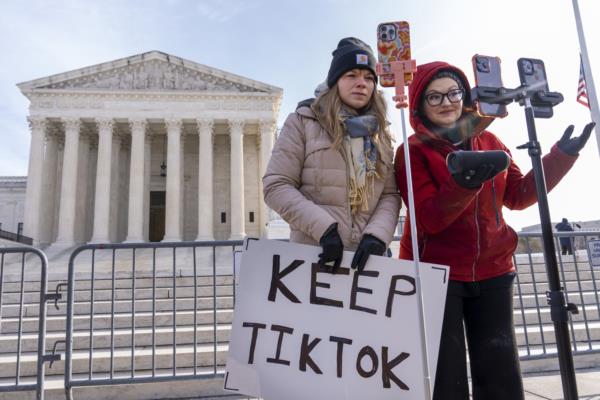
The Supreme Court heard arguments on Friday regarding a law that could potentially ban TikTok in the United States starting on Jan. 19 unless the popular social media platform is sold by its China-based parent company. The justices seemed inclined to uphold the law, citing national security concerns over free speech considerations.
Chief Justice John Roberts expressed apprehension about TikTok's ownership by China-based ByteDance and its obligation to cooperate with Chinese government intelligence operations. The law, passed by Congress and signed by President Joe Biden in April, mandates TikTok to cease operations on Jan. 19 unless a sale occurs.






TikTok's legal representative urged the justices to at least grant a temporary pause to allow the app to continue operating. However, the likelihood of such a decision remains uncertain, with only Justice Neil Gorsuch indicating potential support for TikTok's position.
The Biden administration defended the law, emphasizing national security risks associated with China accessing data of millions of Americans, particularly young users of TikTok. Justices expressed skepticism towards arguments advocating for free speech rights, highlighting the perceived threat posed by the app's ties to China.
Content creators and small business owners reliant on TikTok are anxiously awaiting the Court's decision, as the potential ban could significantly impact their livelihoods. ByteDance has stated its reluctance to sell TikTok under the law's conditions, although some investors, including former Treasury Secretary Steven Mnuchin and businessman Frank McCourt, have shown interest in acquiring the platform.
If TikTok remains unsold, the law would prevent app stores and internet hosting services from offering the app, ultimately rendering it inoperable. The Justice Department has indicated that a sale post-ban could allow TikTok to resume operations, citing the precedent of Twitter's sale to Elon Musk.
The law represents the culmination of longstanding concerns in Washington over TikTok's perceived national security risks due to its Chinese connections. Despite TikTok's denial of being a tool for Beijing, U.S. officials remain wary of potential data privacy breaches and algorithmic manipulation.
A three-judge panel previously upheld the law, prompting TikTok's appeal to the Supreme Court. The justices are expected to make a decision before the Jan. 19 deadline, impacting millions of TikTok users and stakeholders.







